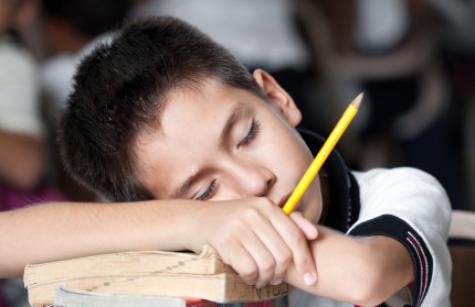A new study has found that up to 40% of children have a sleep problem within the first six months of starting primary school, which is affecting their own, and their parent's mental health.
The study by the Murdoch Children’s Research Institute involved 22 primary schools and over 1,500 students. It showed 27.9% of children had a mild sleeping problem and 10.8% had a moderate or severe sleeping problem.
The most common reported difficulties associated with those who had a sleep problem were difficultly going to sleep, trouble waking in the night and trouble sleeping alone.
Lead researcher, Dr Jon Quach said the findings strongly suggest that the impact of child sleep problems is not limited to sleep.
"We found sleep problems were associated with markedly worse child mental health and parent depression, anxiety and stress," he said.
"This association with poorer child and parent mental health may hinder the child's ability to make a successful transition to school."
Interestingly, media usage and caffeine consumption in children were only marginally associated with children's sleep problems in the study.
The next step for researchers is to address these issues in the hope of improving sleep quality for children before they go to school, which they hope will have an impact on their mental health.
"Our next trial aims to address sleep problems in children starting school. In the study, we will be providing parents with standardised yet flexible strategies to help improve their child's sleep," Dr Quach said.
"Addressing these sleep problems may improve many children's transition to schools, and successfully treating the child's sleep problems could in turn improve both the child and parent's mental health."
Dr Quach said that the sleep problems also account for substantial costs to the health system because of extra medical visits for sleep-deprived children.
Some strategies researchers trial involve child sleep hygiene, such as bedtime routine, media use and caffeine consumption, setting strict bedtimes, and teaching the child to fall asleep without a parent having to be present.
The hours of sleep a child needs varies. The US National Sleep Foundation suggests:
- up to 18 hours for a newborn
- up to 15 hours for 3-11 months
- up to 14 hours for toddlers (1-3 years), and
- up to 11 hours for early school age (5-10 years).
Motherpedia has drawn together tips from regular columnists, Caroline's Angels who are baby sleep specialists, as well as practical sleep specialist, Cliff Sneider from Beds Online, for ensuring children get the right amount of sleep.
1. Set a regular time for bed each night and stick to it
The body needs to learn when it’s time to sleep.Making sure your child goes to bed at the same time every evening will teach this early on. Also try organising cues that trigger in the child’s mind that it’s nearly bedtime such as dressing them in their pyjamas 20 minutes prior to bedtime each evening or making them put toys away an hour beforehand.
2. Establish a relaxing bedtime routine
Routine is important as it lets the body know when it’s time to start getting ready for sleep. Establishing a routine that involves reading a bedtime story, drinking a glass of warm milk or having a soothing bath will help your child relax, sending them off to sleep quicker.
3. Make after-dinner playtime relaxing
Relaxing playtime after dinner gives your child time to unwind from the day before going to bed. That means no extraneous physical or mind-stimulating activities like playing on computers/tablets, playing video games, or watching television.
4. Avoid large meals close to bedtime
Bodies need time to digest food and attempting to sleep soon after eating can be uncomfortable and cause problems with digestion. This can make it hard for children to fall asleep and even cause them to wake up during the night.
5. Avoid anything with caffeine such as chocolate less than six hours prior to bedtime
Caffeine tends to affect children more so than adults so it’s best to avoid things that contain the stimulant for several hours before bed.
6. Put a limit on screen time
Set a time at least an hour before bedtime when there is no more screen time. That means TV, smartphone, iPad, computer and video games.
7. Make sure your children’s bedroom is a comfortable temperature, quiet and dark
The ideal sleep space should be dark and quiet – If your child does not feel comfortable when it is too dark use a very dim nightlight. The bedroom should also be comfortable and cool, with a temperature of 18-20°C.
8. Wake them up at the same time
It’s important that you wake your child at the same time each day, even at the weekends. Read our article on this based on Harvard research here. Your child’s body clock needs a strict routine and in setting a specific wake up time you will notice a consistent amount of energy from your child each day.



















__small.png)










